
Don Miguel Gregorio Antonio Ignacio Hidalgo y Costilla y Gallaga Mandarte Villaseñor, more commonly known as Don Miguel Hidalgo y Costilla or Miguel Hidalgo, was a Criollo Catholic priest, leader of the Mexican War of Independence and recognized as the Father of the Nation.

The Cry of Dolores occurred in Dolores, Mexico, on 16 September 1810, when Roman Catholic priest Miguel Hidalgo y Costilla rang his church bell and gave the call to arms that triggered the Mexican War of Independence.

Guadalupe Victoria, born José Miguel Ramón Adaucto Fernández y Félix, was a Mexican general and political leader who fought for independence against the Spanish Empire in the Mexican War of Independence. He was a deputy in the Mexican Chamber of Deputies for Durango and a member of the Supreme Executive Power following the downfall of the First Mexican Empire. After the adoption of the Constitution of 1824, Victoria was elected as the first President of the United Mexican States.
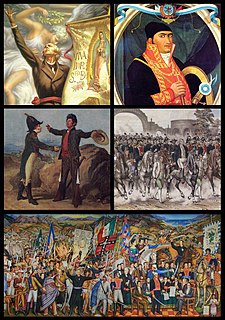
The Mexican War of Independence was an armed conflict and political process resulting in Mexico's independence from Spain. It was not a single, coherent event, but local and regional struggles that occurred within the same time period, and can be considered a revolutionary civil war. Independence was not an inevitable outcome, but events in Spain itself had a direct impact on the outbreak of the armed insurgency in 1810 and its course until 1821. Napoleon Bonaparte's invasion of Spain in 1808 touched off a crisis of legitimacy of crown rule, since he had placed his brother Joseph on the Spanish throne after forcing the abdication of the Spanish monarch Charles IV. In Spain and many of its overseas possessions, the local response was to set up juntas ruling in the name of the Bourbon monarchy. Delegates in Spain and overseas territories met in Cádiz, Spain, still under Spanish control, as the Cortes of Cádiz, which drafted the Spanish Constitution of 1812. That constitution sought to create a new governing framework in the absence of the legitimate Spanish monarch. It tried to accommodate the aspirations of American-born Spaniards, for more local control and equal standing with Peninsular-born Spaniards, known locally as Peninsulares. This political process had far reaching impacts in New Spain, during the independence period and beyond. Pre-existing cultural, religious and racial divides in Mexico played a major role in not only the development of the independence movement but also the development of the conflict as it progressed.

Ignacio López Rayón was a general who led the insurgent forces of his country after Miguel Hidalgo's death, during the first years of the Mexican War of Independence. He subsequently established the first government, Zitacuaro Council, and first constitution of the proposed independent nation, called Constitutional Elements.

Andrés Eligio Quintana Roo was a Mexican liberal politician, lawyer, and author. He was the husband of fellow freedom fighter Leona Vicario.
Gustavo Petricioli Iturbide was a Mexican economist who served as Secretary of Finance (1986–1988) in the last cabinet of Miguel de la Madrid and as Mexican ambassador to the United States.
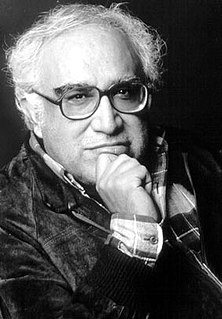
Carlos Monsiváis Aceves was a Mexican writer, critic, political activist, and journalist. He also wrote political opinion columns in leading newspapers within the country's progressive sectors. His generation of writers includes Elena Poniatowska, José Emilio Pacheco, and Carlos Fuentes. Monsiváis won more than 33 awards, including the 1986 Jorge Cuesta Prize, the 1989 Mazatlán Prize, and the 1996 Xavier Villaurrutia Award. Considered a leading intellectual of his time, Monsiváis documented contemporary Mexican themes, values, class struggles, and societal change in his essays, books and opinion pieces. He was a staunch critic of the long-ruling Partido Revolucionario Institucional (PRI), leaned towards the left-wing, and was ubiquitous in disseminating his views on radio and television. As a founding member of "Gatos Olvidados", Monsiváis wanted his and other "forgotten cats" to be provided for beyond his lifetime.

Don Miguel Ramos Arizpe was a Mexican priest and politician, and known as "the father of Mexican federalism."

Félix María Calleja del Rey y de la Gándara was a Spanish military officer and viceroy of New Spain from March 4, 1813, to September 20, 1816, during Mexico's War of Independence. For his service in New Spain, Calleja was awarded with the title Count of Calderon.
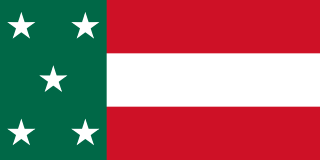
The Republic of Yucatán was a sovereign state during two periods of the nineteenth century. The first Republic of Yucatán, founded May 29, 1823, willingly joined the Mexican federation as the Federated Republic of Yucatán on December 23, 1823, less than seven months later. The second Republic of Yucatán began in 1841, with its declaration of independence from the Centralist Republic of Mexico. It remained independent for seven years, after which it rejoined the United Mexican States. The area of the former republic includes the modern Mexican states of Yucatán, Campeche and Quintana Roo. The Republic of Yucatán usually refers to the Second Republic (1841–1848).

Carlos María de Bustamante Merecilla was a Mexican statesman, historian, journalist and a supporter of Mexican independence. His historical "work early initiated an important Mexican national tradition of searching out and publishing basic materials on the Indian past and its fate in the colonial period." His writings in the 1820s shifted "the antiquarian bias of creole patriotism...into the ideology of a national liberation movement."

The Battle of Calderón Bridge was a decisive battle in the Mexican War of Independence. It was fought in January 1811 on the banks of the Calderón River 60 km (37 mi) east of Guadalajara in present-day Zapotlanejo, Jalisco.
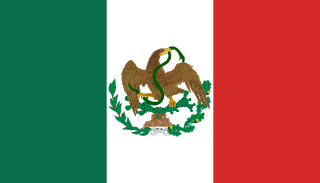
The Supreme Executive Power was the Provisional Government of Mexico that governed between the fall of the First Mexican Empire in April, 1823 and the election of the first Mexican President, Guadalupe Victoria in October 1824. After Emperor Iturbide abdicated, the sovereignty of the nation passed over to congress which appointed a triumvirate, made up of Guadalupe Victoria, Pedro Celestino Negrete, and Nicolas Bravo, to serve as the executive, while a new constitution was being written.
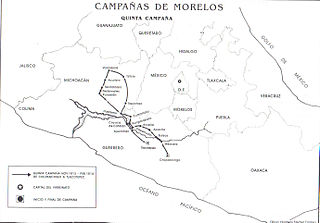
The Battle of Lomas de Santa María was a battle of the War of Mexican Independence that occurred from 23–24 December 1813 in the area around Lomas de Santa María, in the municipality of Valladolid. The battle was fought between the royalist forces loyal to the Spanish crown and the Mexican rebels fighting for independence from the Spanish Empire.
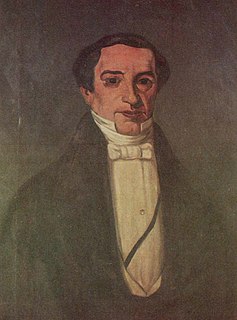
José Manuel de Herrera was a Mexican catholic priest, writer, politician and professor of New Spain. He joined the insurgents during the Mexican War of Independence. He directed the newspaper Correo Americano del Sur.
Del otro lado del puente is a 1980 Mexican musical drama film directed by Gonzalo Martínez Ortega and starring Juan Gabriel, Valentin Trujillo, Lucha Villa, Julio Alemán, Estela Núñez, Narciso Busquets and Ana Laura Maldonado. The story concerns a Mexican who is attracted by stories of unlimited opportunities in the United States, but once he arrives to the country faces a harsh reality, but is nonetheless determined to succeed.














